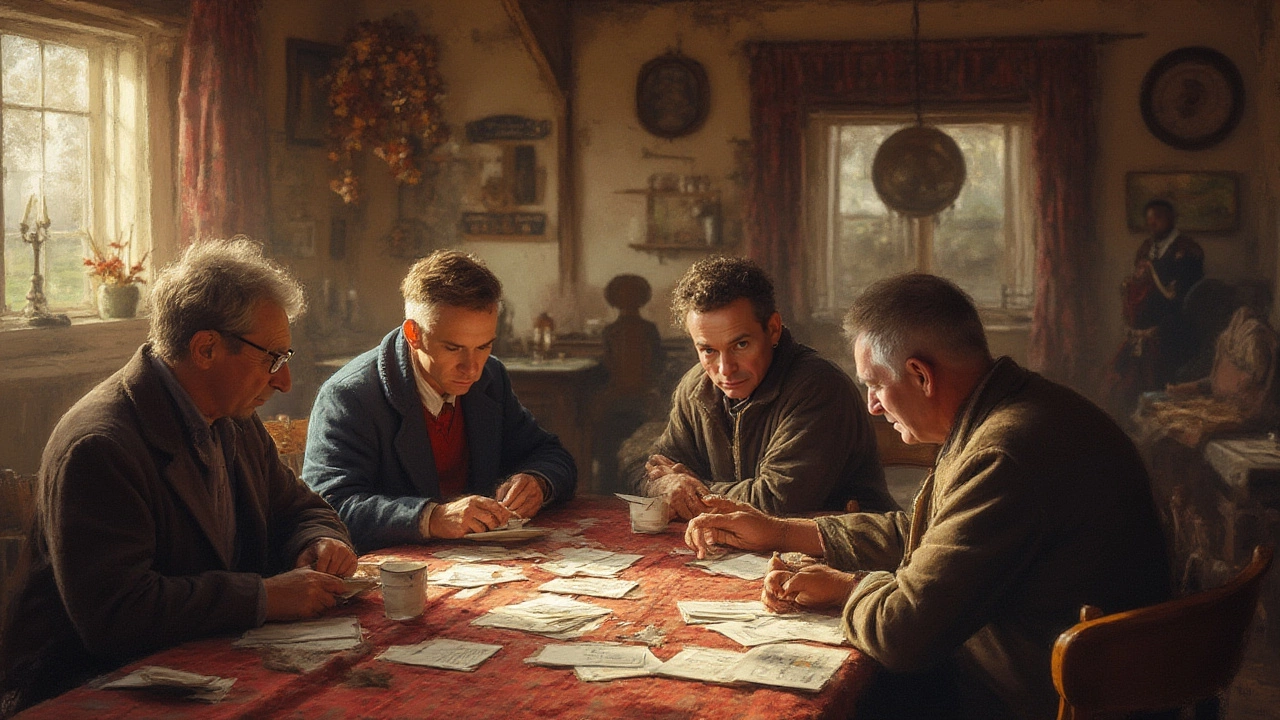What Makes a Good Golfer? Skills, Traits & Secrets of Top Golf Players
 Jul, 31 2025
Jul, 31 2025
Most people picture a good golfer as someone who hits every fairway, sinks every putt, and always seems to walk off the course with a smile and a low scorecard. But here’s where it gets interesting: being a good golfer goes way beyond that textbook swing. Ask around any Sydney golf club, and you’ll hear all sorts of answers—sometimes passionate, sometimes a bit confusing. Let’s clear up the mystery about what we actually call a good golfer and why the real answer might surprise you more than a hole-in-one on a windy day.
The Golfer’s Vocabulary: How We Talk About Skill
When you’re out on the green, words matter. Pros, coaches, and weekend warriors all have their own vocab for describing someone who’s truly skilled. The most common term you’ll hear is ‘scratch golfer.’ That’s someone who plays to a handicap of zero—meaning, on an average day, they shoot par. These players are the kind you’d see playing for club championships or joining the medal round. Occasionally, you’ll hear about a ‘single-digit handicapper’ in conversation—a person with a handicap of 9 or lower. This label carries real weight and opens up doors to more challenging competitions.
But good golfer doesn’t always mean a low handicap. Friends call a consistent player a ‘steady hand’ or a ‘money player’ if they show up under pressure. The phrase ‘pure ball-striker’ gets thrown around when someone hits clean, crisp shots, rarely mishitting the ball. And, trust me, there’s a certain respect for anyone known as a ‘short game wizard’—those magical folks who can get up and down from anywhere around the green. Some even go so far as to call a great putter ‘deadly with the flat stick.’
What about on Tour? The best of the best are ‘Tour pros,’ obviously. But descriptors like ‘major winner’ and ‘elite’ float around. Some Aussie golf circles even mix in terms like ‘gun golfer’ or ‘legend’ for those especially memorable amateurs at the local club level. It’s a quirky mix of formal and informal language, but each term points to one thing: respect earned on the fairways.
For beginners, a good golfer might simply be ‘the best in my group.’ There’s no strict rulebook; most names come from a shared respect or awe—like the way you feel watching Adam Scott nail a long eagle putt. So, if you’re after the exact phrase, ‘good golfer’ itself is the most all-purpose and widely understood label. But dig deeper, and you’ll find a whole world of nicknames and honorifics, depending on who’s talking and where you’re playing.
At the end of the day, these names do more than describe—they inspire. When someone calls you a ‘good golfer’ after a round, you feel like you’ve earned a badge. It’s every bit as rewarding as breaking 80 for the first time or finally mastering that impossible bunker shot.
Skills and Traits that Define a Good Golfer
Let’s break down what actually separates the good golfers from the weekend hackers. Raw skill is just the start, and anyone who thinks you just need muscle or expensive gear is missing the big picture entirely. The first big thing: consistency. Great golfers don’t just have one perfect swing—they hit the same quality shot, time after time. They’ve drilled muscle memory, practiced from all sorts of lies, and can keep their cool even when things go sideways. At my local club, I see golfers who might not drive it 300 meters, but they’ll score par by grinding out smart shots, one after another.
Another marker: course management. Good golfers take the mental side seriously. They’re always thinking a step ahead—how does the wind affect their next shot, where’s the safest miss, and when should they take a risk versus play it safe? This chess-like thinking sets them apart from those who just grip it and rip it. Talk to any elite amateur, and they’ll tell you that ‘playing smart’ can sometimes save more strokes than a perfect drive ever will.
Nerves of steel: the mental game is massive. Golf is notorious for turning small mistakes into massive blow-ups. I’ve seen friends melt down after one bad hole, but good golfers reset. They have routines—deep breaths, focusing on each shot, having short-term memory. There’s actually a study by the University of Sydney from 2023 that showed golfers with pre-shot routines and strong emotional control took fewer penalty strokes and made better decisions under pressure. It sounds simple, but this mental edge is what you see when someone calmly sinks a five-foot putt to win a match.
Let’s not forget the short game. Sure, bombs off the tee look impressive, but good golfers know that most shots happen inside 100 meters. Chipping, pitching, sand play—those areas separate someone stuck at bogey golf from the rare birdie-maker. Ever watched a pro chip in for par after missing a green? That’s not luck; that’s mastery. Want to test yourself? Count how many up-and-downs you make in a round. Low handicappers usually make almost half. That’s no accident.
Finally, there’s attitude. Sounds cliché, but a ‘never-say-die’ approach keeps a good golfer fighting when things get rough. I’ve played with golfers who start with a double-bogey but finish strong because they refuse to quit. They encourage others, own their mistakes, and never get too high or low. A good golfer doesn’t just swing well. They handle adversity with grace and keep the game as fun as it’s meant to be.

How to Become a Good Golfer: Actionable Tips
Ready to level up? Start by tracking your own stats. Forget what your scorecard says—how many fairways did you hit? How many greens in regulation? Where did you leak shots? By using simple golf apps or just some old-fashioned notepad math, you can spot trends and know where to focus.
Invest in practice with purpose. Don’t just smack balls at the driving range until your hands go numb. Instead, create mini-challenges—try hitting 10 consecutive fairways, or practice from bunkers until you can reliably get out in one. Mix short game drills into every session. A fun one: play a ‘par-18’ game from nine different spots around the practice green and see if you can get up and down for ‘par’ (two shots) each time. If you’re regularly at 20, you’re on the right path; break 18, and you’re short-game royalty.
Work on mental toughness. Create pressure situations in practice. Try ‘one ball, one shot’ where you play a full round by yourself, using each shot as if it mattered for the club title. Practice routines for calming nerves—deep breathing, visualization, positive self-talk. Watch professional tournaments and pay attention to how the top players walk, talk, and handle bad bounces—it’s more about resilience than perfection.
Don’t forget the importance of lessons. Even Adam Scott and Min Woo Lee—two top Aussie pros—use coaches to check their swings. A few sessions with a certified PGA pro can save you years of frustration. They’ll spot flaws you can’t see in a mirror and recommend drills that make a real difference. If you’re on a budget, try group clinics at your local course. Great teaching doesn’t have to break the bank.
Finally, surround yourself with better players. There’s no substitute for experience. Join a club comp, play with low handicappers, or seek advice from seasoned golfers who’ve been through all the ups and downs. Most are happy to share tips—everything from selecting the right club to reading tricky greens. The key is to keep learning and never settle. Every round offers a lesson, if you’re paying attention.
Misconceptions and Myths About Being a Good Golfer
Let’s bust a few popular myths. First, you don’t have to have a monster swing to be called a good golfer. Sure, watching Rory McIlroy hit 330-meter bombs is cool, but most skilled golfers get by with solid contact, smart aim, and a repeatable motion. Distance is nice, but accuracy and thinking are way more important.
Another myth: fancy equipment makes the golfer. You’d be shocked how many scratch players use clubs that are several years old. While new drivers claim to add metres, most gains come from fitting clubs to your swing and knowing how to use them. A good putter, a sand wedge you trust, and a driver that fits your eye? Far more valuable than chasing the latest gear hype—though sometimes Ava teases me about my collection of old putters lurking in the garage.
Some people think you have to practice every day to be good. Honestly, quality trumps quantity. Focused, smart practice—hitting short wedges, rolling putts with purpose, using drills designed for improvement—gets you there much faster than endless hours with no plan. There’s proof: Golf Australia ran a study last year showing that players who used structured practice improved their handicaps by twice as much as those who just hit random balls at the range.
Don’t let scorecard obsession get in your head. The number at the end matters, but chasing a ‘perfect’ score each time out only adds stress. The best golfers treat each round as a challenge, looking for small wins—a tough recovery, a sharp approach, or handling nerves well. Celebrate progress in effort and attitude, not just in digits.
Finally, don’t fall for the idea that it’s all about natural talent. Sure, some players pick up the game fast. But most good golfers? They’re the ones who grind, tinker, ask questions, and stay patient. It’s about showing up, learning from your bad days, and making the next round a little better than the last.
So, what do you call a good golfer? The label itself doesn’t matter much—what counts is how you play, how you learn, and how you carry yourself for 18 holes and beyond.